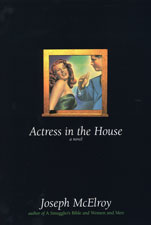

|
Actress in the Houseby Joseph McElroy Edition History: |
|
Struck in the face, the girl "in the darkened house" is staggered but doesn’t fall. The man in the eighth row of this obscure downtown warehouse theater is riveted, has mixed feelings, thinks the actress on stage seemingly in shock and staring out into the house may be staring at him. Daley has never before set eyes on this young Canadian woman half his age, yet is not entirely unacquainted with her either. Almost against his will, and with disconcerting abruptness, her life, and the people who have tried to control her, will invade his own. Engaging each other with a humor and uncanny intimacy on the night streets of Manhattan, Becca and Daley begin a precarious period of discovery, each new disclosure opening a further dimension, slipping a boundary to both past and future. With the force of revelation, a map connecting their lives emerges in stark relief — just as the events that have brought them together threaten to tear them apart. |
|
Reviews for Actress in the House |
|
|
Sven Birkerts New York Times Book Review April 20, 2003, ... in "Actress in the House" McElroy [uses] incident as a pretext for what comes to feel like a phenomenology of consciousness. He would explore the porousness of the mind to associations and surges of memory, and meditate on the almost climatic agitations created by intense personal interactions ... Turning the pages slowly, we feel as if we were moving underwater, with visibility available only in sunlit flashes; there is a distinct (but by no means unpleasant) sensation of obscure currents moving this way and that. ... we experience what might be called "congealing moments," where random actions and observations suddenly suggest intense significance. ... Intrigued, goaded by a hundred local intensities (McElroy can stun you over and over with a sidelong phrase) I shouldered my way from scene to scene. And in the end, as after a disquieting dream, I knew I had been in a hypnotic sort of elsewhere. ... In an interview he conducted last year ... McElroy at one point asked ..., "Should writing hurt?" The same question can be ventured here. How you answer will help you decide whether or not to read this most singular and stylistically uncompromising of novels. |
|
|
Paul Quinn Times Literary Supplement April 25, 2003, ...Actress in the House rewards the reader's efforts with glinting felicities and the gradual excavation of a complex narrative architecture. ... McElroy escorts us expertly through concentric circles of information from "history, in a small way" of lovers to the large events of "public knowledge." He finds it impossible -- and irresponsible -- to write a love story that is not intimately entwined with global events ... Obsessed with connectedness, McElroy is strangely often at his best when dealing with missed connections ... "a question, a wrinkle of knowledge ... and the moment passed." McElroy refuses to iron out the wrinkles of knowledge ... [He] is an exact contemporary of Don DeLillo and the two New York writers share an intensity of focus and a geo-political perspective ... McElroy's [sentences] approximating the world in process and the thought before it is fully formed. In spite of this, they often attain a disjunctive poetry all their own which sometimes resolves into more conventionally sensual details ("She had a way with her hips, a curious bell tolling just for you") and wit. McElroy is bravely determined to describe people, things and the planet, in the round, and there is an integrity of vision that shines through the difficulty. |
|
|
Rick Moody, "By what trick of fate is it not universally acknowledged that Joseph McElroy is one of the most supple, complex and insightful writers of American prose? Actress in the House, which is by turns mesmerizing, demanding, frightening and achingly compassionate, is more evidence of McElroy's stealthy genius. Here's a contemporary voice that is surely as important as Pynchon, Gaddis and DeLillo." -- Rick Moody |
|